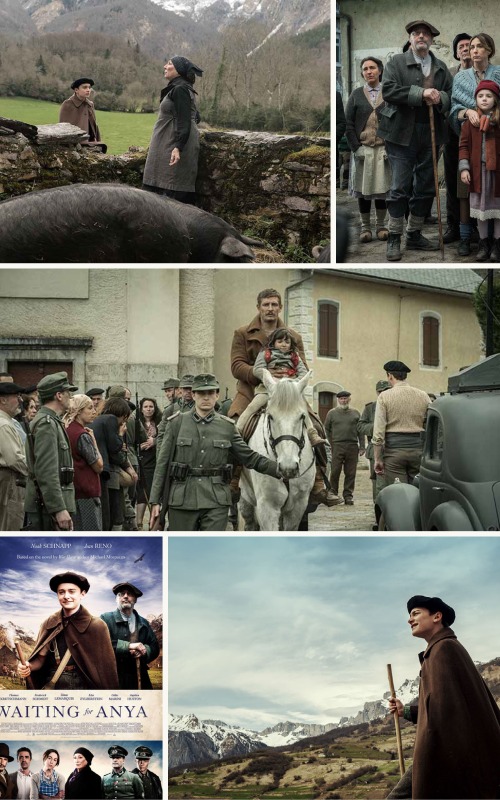 WAITING FOR ANYA. 2020. Starring: Noah Schnapp, Anjelica Huston, Thomas Kretschmann, Frederick Schmidt, and Dolma Raisson. Directed by Ben Cookson. Rated M (Violence). 109 min.
WAITING FOR ANYA. 2020. Starring: Noah Schnapp, Anjelica Huston, Thomas Kretschmann, Frederick Schmidt, and Dolma Raisson. Directed by Ben Cookson. Rated M (Violence). 109 min.
This English-speaking, historical war drama is co-produced by the United Kingdom and Belgium, and is written by the film’s director (Cookson) and Toby Torlesse. It is a film adaptation of the young-adult novel of the same name, written by Michael Morpurgo in 1991. The film tells the story of a young shepherd boy, Jo (Schnapp), who discovers a group of Jewish children hidden on the remote farm of the reclusive Widow Horcada (Huston), who lives in Lescun, a village in Southern France. Horcada hides the Jewish children on her pig farm, but she is also harbouring a Jewish man, Benjamin (Schmidt), her son-in-law, who has lost track of his daughter, Anya, hoping to find her one day. Under suspicion, Horcada, Jo, Benjamin and others, negotiate one last journey for the children over the mountains to freedom from Nazi persecution.
Horcada and Benjamin struggle to try to get children across the Pyrenees mountains, that separate Southern France from Spain. The film explores the history of WWII, as seen through the eyes of Jo in the summer of 1942 in the German occupation of France.
Jo, a Gentile, is just 13, and his father is in a German POW camp. Jo befriends Benjamin, who is ‘Waiting for Anya’, after his daughter was separated from him. Jo decides to keep the rescuers’ business secret, and does what he can to help. He supplies intelligence to Horcada to get the children across the border. His decision to help threatens his own survival, and a last-minute occupation of Lescun by German soldiers blocks a final group of children wanting to escape from the village to Spain. A risky escapade – the children’s ‘last chance to escape’ – is subsequently put in place, in an attempt to get past the watchful gaze of the German soldiers.
Lescun is one of the last villages to be occupied. A senior Nazi officer (Tomas Lemarquis) is cruel and unfeeling. Another, the Corporal (Thomas Kretschmann), is a kinder person, who has memories of losing his own daughter, and he makes a decision at the final moment to protect the fleeing children. After the war is over, Anya (Raisson) arrives at the village, and is joyously welcomed by Benjamin, Horcada, and Jo, who – as an old man – narrates the movie.
Of necessity, this is a film that deals with violent happenings, and it tells of a period that is a dark part of human history. The film has been classified ‘M’ because it profiles violent events, and because of the ‘violence’ it shows. The rating is intended to indicate that parents should be cautious about what their children should see. However, rather that conveying a warning to keep away, this is a film that mature children should see in the company of their parents, so that the lessons of forgiveness and hope in evil times can be mutually understood, discussed, and shared. It is a film adaptation of events that are part of human history, not to be forgotten, and the film is intended to convey a young boy’s personal resolve, in the company of those he trusts, to assist people in dire need. The film is basically a coming-of-age story for Jo, set in a changing world, beset by extreme prejudice. Huston gives an impressive, dramatic interpretation of Benjamin’s mother-in-law, who is full of bitterness and anger at what is happening around her.
The cinematography powerfully contrasts the horror of war with the pristine beauty of the French Alps, and the film teaches the value of kindness and hope in war time. Above all, it is a cautionary tale captured by a history of dark events. The film explicitly keeps the horror of war and violence at a level suitable for younger audiences to understand, and as a tale of bravery in the face of evil, it movingly succeeds. Its messages are important ones. The movie asks whether people, with terrible orders to follow, can also be good and kind. It further raises the significant issues of what price is compassion and integrity (there is ‘always a price to be paid’, the film says), and what motivates moral behaviour in the face of extreme danger.
Rialto Distribution
In Select Cinemas 14 October 2021